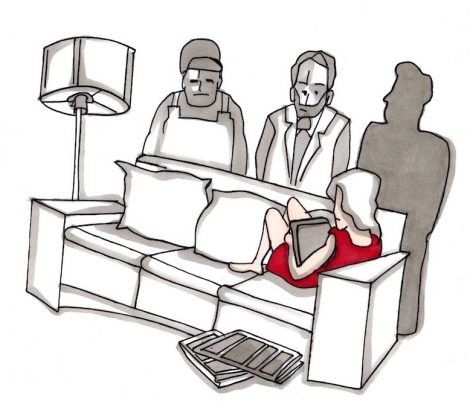„Engineer (f/m) wanted!“ – Why women would (not) apply

Politics are currently discussing the implementation of women’s quota regulated by law. Additionally, there is an intensive debate within the companies about raising the proportion of women in top management teams and the upper echelon (although it is not always reasonable; please, see BION published in February 2013). However, the gender distribution remains unequal among certain job areas. Some job areas are rather female-dominated, such as nurse and office manager, while other areas are clearly male-dominated, such as plumber and engineer. Due to the debate about equal opportunities and demographic change one calls for a more balanced gender distribution in these areas. However, employers suspect that women are not interested in certain disciplines, educational subjects, industries or hierarchical levels. But is this the only explanation? Given that German employers are still hiring the “female secretary to the board of directors” in job advertisements (Bauhoff & Schneider, 2013), the question arises whether gender-specific wording in job advertisements exists and how this kind of wording might influence the application behavior of women and men.
Recently, research in psychology examines these questions. For example, Gaucher, Friesen, and Kay (2011) conducted several experiments with young job seekers and students. The authors analyzed the terms and wording in more than 4,000 job advertisements and found a stronger masculine wording in male-dominated areas, whereas the wording was rather feminine in female-dominated areas. Masculine terms are categorized as, for example, “dominant”, “assertive”, and “confident”, whereas feminine terms are “understanding”, “support”, and “together”. In addition, the authors found that both women and men equally assume companies to employ a higher proportion of males if their job advertisement was worded in masculine terms.
The experiments by Gaucher and colleagues (2011) also showed that gender-specific wording in job advertisements influences the attractiveness of a vacancy. The same vacancies are less attractive to women if the wording was masculine instead feminine in the job advertisement. However, the job area was irrelevant to women (e.g., engineer, real estate agent, nurse); only the gender-specific wording influenced the attractiveness of the vacancy. In contrast, men were not influenced by gender-specific wording in job advertisements. An earlier study by Born and Taris (2010) showed similar results. Women are more sensitive to gender-specific wording in job advertisements and they are more attracted to feminine than masculine wording; however, men were indifferent to the gender-specific wording.
The authors also showed that the application behavior of women was also influenced by whether the job vacancy was worded in terms of masculine/feminine traits or masculine/feminine behavior. To this end, the authors varied the wording of desired profile in their experiment (e.g., trait “…a successful candidate should possess high levels of creativity” or behavior “…a successful candidate should be able to generate original ideas and solutions for particular issues”). If the successful candidate was described in terms of a masculine behavior, women rated the vacancy more attractive than similar requirements described in terms of masculine traits.
Thus, previous research showed that gender-specific wording exists in job advertisements and this kind of wording has an influence on the application behavior of women. In a worst case scenario, well-fitting women do not apply for a specific job, even though they would be the ideal candidates. Especially, masculine wording in job advertisements has a negative influence on the self-selection of women. Thus, the starting point for the promotion of women and the increase of the proportion of women in male-dominated areas is not within the organization itself; it starts with the awareness of gender-specific wording in job advertisements.
Sources

